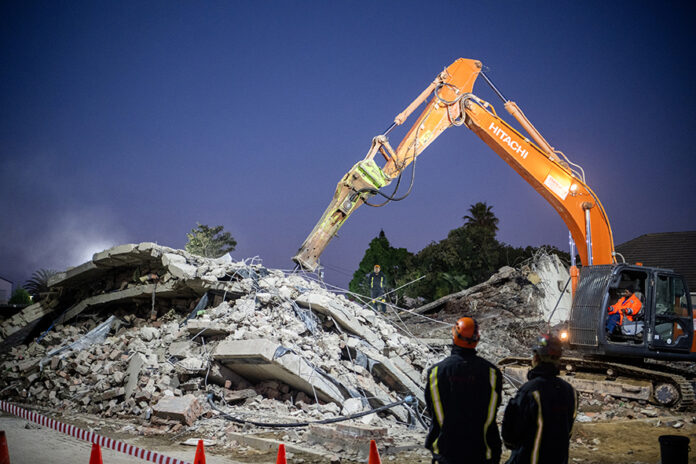The George building collapse, which killed 34 construction workers in May 2024, was a result of serious failures by both the developer and the National Home Builders Registration Council (NHBRC), according to a newly released report.
Minister of Human Settlements, Thembi Simelane, released the final findings of the NHRBC investigation on Wednesday.
“The investigation concluded that the collapse of a building was a result of systematic failures across multiple levels of oversight, non-compliance with regulatory standards, and mismanagement by both NHBRC and the project’s personnel.
Series of failures
“These failures included irregular status upliftment, late enrolment, inspection lapses, material quality issues, and safety violations. The report points largely on the failures of inspectors and internal controls in as far as NHRBC is concerned,” said Simelane.
The report was based on a forensic investigation commissioned by the NHRBC. It looked into what caused the collapse of the building, which was still under construction at the time.
Among the major problems discovered was that the company building the project did not disclose that it planned to construct a multi-storey building. Simelane said this is a direct violation of NHBRC rules.
She said construction even began before the project was properly enrolled. And the NHBRC login credentials were misused during the approval process.
Inspections were also a major concern, according to Simelane. The first inspection happened later than allowed. And reports included information on sections of the building that had not yet been built.
No proper safety measures/features on site
In addition, there were no proper safety procedures on site. And key workers, including inspectors and the technical manager, were not properly qualified for their roles.
The report also found that the building plans were approved by George Municipality after construction had already started. The site’s soil and engineering assessment were incomplete. This made the foundation unsafe from the beginning.
She said the investigation report made recommendations for the NHBRC to improve and enhance transparency, quality assurance, and enforcement efficiency for high-risk projects.
“The recommendations included that the NHBRC registration certificate must state clearly the types of buildings the homebuilder is registered to construct, and that the NHBRC establishes a dedicated or ad-hoc peer review team to independently review high-risk projects such as multi-storey buildings,” said Simelane.
Officials suspended
“The report went further to recommend that technical managers be full-time on-site during critical stages of construction. Also that inspections be conducted within five days. NHBRC staff must not be allowed to use another staff member’s login credentials,” she added.
Following the inquiry, NHBRC suspended officials. And the case has been handed over to law enforcement. Those involved may face charges of negligence, dishonesty, and misconduct, said Simelane.
Government has also taken steps to strengthen regulation. This is through the signing of the Housing Consumer Protection Act (Act No. 25 of 2024) by President Cyril Ramaphosa. It came into effect this year.
She explained that this law introduces stricter rules for registering builders and developers. These include mandatory grading based on technical and financial competence.
Simelane said it also gives more power to inspectors and provides strong penalties for non-compliance. Penalties of up to R1-million for administrative breaches, and up to R1.5-million or 10 years in prison for criminal offences.



